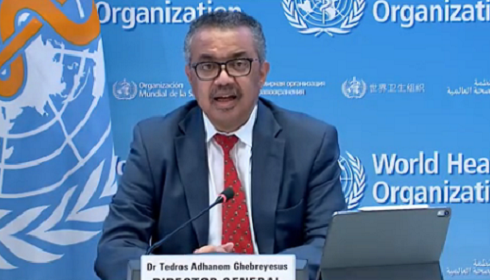
Dr. Tedros Warns Against Complacency Amidst COVID-19 Persistence Worldwide
In a detailed address marking the final media conference for 2024, the Director-General of the World Health Organization (WHO), Dr. Tedros Adhanom Ghebreyesus provided a nuanced evaluation of the year's public health landscape, merging milestones with depressing realities. The address emphasized progress in disease elimination, the challenges posed by conflicts and pandemics, and the organization's evolving response to global health concerns.
Dr. Tedros emphasized that the year saw significant advancements in disease elimination. Dr. Tedros certified nine countries for eradicating specific diseases. Cabo Verde and Egypt declared the eradication of malaria, while Brazil and Timor Leste declared the elimination of lymphatic filariasis. India, Pakistan, and Vietnam eradicated Trachoma, Jordan eliminated leprosy, and Chad eradicated human African trypanosomiasis.
"These milestones are a testament to global collaboration and commitment to health equity," the Director-General stated. 17 African countries administered more than 12 million malaria vaccine doses, marking a significant step towards the eradication of a disease that has long plagued the continent.
In parallel, WHO prequalified a novel dengue vaccine and authorized the emergency use of mpox vaccines and diagnostics, bolstering its position as a worldwide immunization leader.
Underscoring the Progress and Pitfalls in Global Health Challenges, he stated: "While celebrating these victories, the Director-General warned against complacency." "The world might want to forget about COVID-19, but we cannot afford to," the scientist stated. Despite advances in pandemic planning, COVID-19's persistence—with around 1,000 deaths each week—serves as a harsh reminder of global health system weaknesses.
Emerging health hazards highlighted the dangerous balance of progress and relapse. Rwanda effectively contained a Marburg virus outbreak, but cholera mortality increased by 71%, measles infections increased by 20%, and diabetes reached frightening proportions, affecting more than 800 million adults worldwide.
Adding to these issues was the appearance of an unidentified disease in the Democratic Republic of the Congo, which mostly affected children under the age of 14. Limited infrastructure and isolated places hampered response efforts, highlighting global health equity discrepancies.
The WHO Director-General expressed concern about the Shadow of Conflict on Health Systems, stating that ongoing hostilities in Gaza, Sudan, and Ukraine had exacerbated public health concerns. WHO confirmed 1,370 attacks on healthcare facilities in 14 countries, with 805 deaths and 1,545 injuries. In Syria, increased fighting has stressed an already frail health-care infrastructure, leaving millions in need of trauma care, maternal health services, and mental health assistance.
"Our focus remains on addressing urgent health needs, restoring essential services, and strengthening health systems," he said. Recent activities include transporting trauma supplies to hospitals in Aleppo, Idlib, and Damascus, as well as advocating for unhindered humanitarian access to afflicted areas.
He called for building resilience for future health crises. In reflecting on the five years since the initial COVID-19 reports, the Director-General evaluated the world's preparedness for future pandemics. "Are we better prepared?" "Yes, and no," he commented. He cited the Pandemic Fund, the mRNA Technology Transfer Hub in South Africa, and the WHO Hub for Pandemic and Epidemic Intelligence in Germany as revolutionary initiatives.
Member states have made progress towards implementing the WHO Pandemic Agreement, which is projected to be finalised by May 2025. "We have learned painful lessons from COVID-19, but much work remains to address its systemic weaknesses," a spokesperson said.
On Universal Health Coverage (UHC) Day, the Director-General emphasized the crucial need for fair healthcare access. Despite improvements, half of the world's population still lacks access to basic health services, and two billion people experience financial difficulty as a result of medical costs.
"Families should never have to choose between medicines and meals," he said, emphasizing the need for financial security as a cornerstone of universal health coverage. In line with the WHO Constitution, he emphasized that health is a fundamental right, and he urged governments to put this idea into effect.
As the WHO prepares to inaugurate the WHO Academy in Lyon and implement its four-year global health strategy, the Director-General emphasizes the significance of long-term financing and collaborations. "The challenges of 2024 remind us that health is not a privilege but a universal necessity," he said.